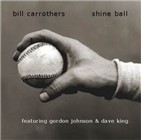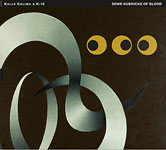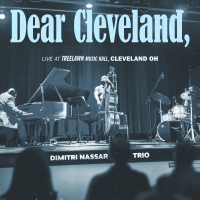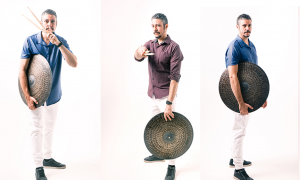Home » Jazz Articles » Interview » Bill Carrothers: See the Piano, Play the Piano
Bill Carrothers: See the Piano, Play the Piano

The quest for chaotic and stupid finger seems an unusual one for a jazz pianist. But then, a conversation with Bill Carrothers reveals an unusual man; one who is to-the-point and forthright to a fault, perhaps, and one who's words spill from his mind unfiltered by anyone's expectations. Much the way his playing on Joy Spring (Pirouet, 2010)—a celebration of the music of hard bop trumpet icon Clifford Brown—seems to spill from his fingers. It's a conversation that careens from jazz, global warming and baseball to home restoration projects, the difficulties of reroofing his Mass City, Michigan home, James Joyce and reloading his own bullets. But mostly it's music.
Early Struggles/Early Recordings
Carrothers' trajectory as a jazz artist has been fairly normal: piano lessons when he was a kid, which he says he hated, then a stint at North Texas State University's jazz program that he walked out of early on, followed by the seemingly required pilgrimage to New York City. He spent some time in the Big Apple, 1988 to 1993, but then retreated to the Upper Peninsula of Michigan. "Me and New York did not get along," Carrothers explains. "Five years, and it wasn't five of my better years. And that's a long story. I don't do well in big cities; I don't do well with lots of people around. I find it very useful for me to keep my interactions with other people finite, and on my own terms. I really like people when I'm around them. When I choose to be with people, I really have fun and have a great time, and then I like to disengage and go back to my hole and be alone. That's just how it works for me. When you go to the city, you're constantly having your bubble invaded. I grew up in the country, and I need trees."
He is adamant, to the point of pugnacity. After a long and often rambling but always interesting conversation, he gives the impression that he is a man who has—with the exceptions of his music, his family and baseball—a tempestuous relationship with life.
When asked what's outside his window right now, he states: "Trees." Though, he adds, "Another couple of years this is gonna to be palm trees in the U.P (Upper Peninsula). Listen, there's a lot of people up here who'd be perfectly happy with that. Global warming; everyone talks about global warming and how horrible it is, [but] for anyplace north of here, it's great. It's the best news they've heard all month." Carrothers' profile, in spite of some inspired recordings, has hovered around the lower end of the spectrum. Even Home Row, a 1992 trio outing with the legendary Gary Peacock on bass, was unable to find a home until his current label, Pirouet Records released it in 2008.
Carrothers' profile, in spite of some inspired recordings, has hovered around the lower end of the spectrum. Even Home Row, a 1992 trio outing with the legendary Gary Peacock on bass, was unable to find a home until his current label, Pirouet Records released it in 2008.
His music is often informed by his interest in history. Civil War Diaries: Solo Piano (Illusion Music, 2005) and Blues and the Greys: Music of the Civil War (Bridge Boy Music, 1998) explored the music of the War between the States, but it was his study of the music of the First World War, the two-CD set Armistice 1918 (Sketch Music, 2004), that was his breakout effort, the one that got the reviewers writing and found its way onto many of that year's top ten lists.
Joy Spring
Trumpeter Clifford Brown (1930-1956) was one of hard bop's pioneers. The sides he recorded with drummer Max Roach in the early to mid-'50s are masterpieces of the genre. He is another of jazz's too-soon-gone geniuses, dying in a car accident in 1956.
When asked why a tribute to Brown, Carrothers says, "I've always played swing music. Armistice [1918] is really more of an anomaly than the Clifford Brown stuff. Most of the trio efforts I've made are more off-kilter, but they've been standards records, or music from the standard repertoire. Now, with the Clifford Brown stuff, what's going on is he's the first jazz guy that I fell in love with. Him and Oscar Peterson. I listened to a lot of Clifford Brown's stuff when I was thirteen, fourteen years old, the old LPs on MRC, and I wore at least two of those sets out. So it was just kind of returning to a music I loved when I was younger, and continue to love, and I think it's criminally under-recorded.
"[With] a lot of his music, it dawned on me that nobody ever does these tunes," Carrothers continues, "and it's kind of surprising to me. They're really great tunes and everyone kind of has that canon of stuff that everyone plays. Somehow [Brown's] hasn't made it to that canon, and I don't really know why. 'Gertrude's Bounce,' and even that blues, 'Gerkin for Perkin,' a slick little blues tune that no one every plays. So my interest was twofold: return to something I enjoyed when I was younger and to bring my own thing that I do to it, and also to bring up this kind of music, which is neat music; I was hoping to do my tiny little part to bring it some recognition again."
The set opens with Benny Golson's "Junior's Arrival." It is bright, up-tempo, bouncy, full of sparkling notes that seem to tumble from Carrothers' fingers. The original tunes written and chosen by Brown, recorded in the fifties, have a tight architecture and solid structures. Carrothers gets inside them and loosens up some of the bolts, pries some of the nails out of the studs and gives some elasticity to those structures. The results may not be chaos, but they inject a bit of that element, beautifully, into the bebop tunes. "[I practice] just enough to get my fingers together," Carrothers explains. "And most of my practicing is just finger stuff for classical music. I've been working on the [Bach] Goldberg Variations, and I do the Two Part Inventions and Mozart, just stuff to keep my fingers together. But I don't practice jazz very often. I don't want to. I want to keep my fingers in a state of chaos, it's much better that way, because it keeps you from the clichés; it keeps me from playing the clichéd stuff."
"[I practice] just enough to get my fingers together," Carrothers explains. "And most of my practicing is just finger stuff for classical music. I've been working on the [Bach] Goldberg Variations, and I do the Two Part Inventions and Mozart, just stuff to keep my fingers together. But I don't practice jazz very often. I don't want to. I want to keep my fingers in a state of chaos, it's much better that way, because it keeps you from the clichés; it keeps me from playing the clichéd stuff."
On Joy Spring's title cut, Carrothers drastically changes Brown's take on the tune, slowing it down from its gregarious ebullience, turning it into a beautiful and solemn hymn. "When I was younger I was a real fireballer," Carrothers explains. "I played lots of notes and I was really fast and I could play super type bebop stuff when I was 22, 23 years old.
"Then I saw Shirley Horn play," Carrothers continues. "My then girlfriend and now wife, Peg, took me down to the Vanguard to see Shirley Horn. That night kind of changed my life. And I realized how much interest there could be in playing slow like that and it kind of changed my playing. But either way I noticed, in my playing, that there was a lot of stuff I did just because I could do it. It's a danger, you're letting your fingers do the walking and playing the things you can play because it's impressive. And there's a certain amount of ego in it, so if you keep your fingers stupid, then all you can play is the stuff you can hear. So I try to keep my fingers stupid."
On "Jacqui," Carrothers shows he can still fireball it, and he has no problem avoiding clichés. He and his trio mates—drummer Bill Stewart and bassist Drew Gress—drive deep inside the tune, hooking into the groove, Carrothers dancing with Lady Chaos, without letting her quite take the lead. And he seems to be playing his piano in a state of ecstasy.
 "I just [made] a solo piano recording last summer [2009], of all-original music, and most of it was spontaneously recorded in a studio," says Carrothers. "[I] just played a bunch of two, three and four minute vignettes, just off the top of my head, and about four or five of the tunes—I think there's fourteen or fifteen tunes on the album—are things I had written before, original things of mine. Then there's one standard on there, "Harbor Lights." I think Pirouet's talking about buying that off of me and putting it out. So that would be coming out; also, Pirouet recorded my European Trio (with bassist Nicolas Thys and drummer Dre Pallemaerts) when we played at the Vanguard last summer [July 14-19, 2009]. We played a week at the Vanguard and we played a bunch of things, some of my music and some Clifford Brown and some standards; just played the stuff we like to play for a week there, and they recorded three nights of that. I think they're gonna do something with that at some point.
"I just [made] a solo piano recording last summer [2009], of all-original music, and most of it was spontaneously recorded in a studio," says Carrothers. "[I] just played a bunch of two, three and four minute vignettes, just off the top of my head, and about four or five of the tunes—I think there's fourteen or fifteen tunes on the album—are things I had written before, original things of mine. Then there's one standard on there, "Harbor Lights." I think Pirouet's talking about buying that off of me and putting it out. So that would be coming out; also, Pirouet recorded my European Trio (with bassist Nicolas Thys and drummer Dre Pallemaerts) when we played at the Vanguard last summer [July 14-19, 2009]. We played a week at the Vanguard and we played a bunch of things, some of my music and some Clifford Brown and some standards; just played the stuff we like to play for a week there, and they recorded three nights of that. I think they're gonna do something with that at some point.
"And then I'm working on something that's like the Armistice [1918] recording," Carrothers continues. I went to like seven labels with that recording and no one wanted it, and I'm having the same difficulty with this new one. I've taken it to a bunch of people and nobody's interested. It's a recording with washboard and banjo, like an old, old Dixieland recording [but] with modern harmony, with that feel to it, and with tuba. And with a brass band with piano, too. I've interested Bill Stewart in playing washboards, which he's never really done. He said he'd think about it; he said he'd try it. I haven't worked out anybody else, but I can't find a label that's interested. It's a strange project, but Armistice [1918] was a strange project, too, and nobody wanted to touch that, but it worked out."
See the Piano, Play the Piano
Carrothers is a big baseball fan. He's originally from Excelsior, Minnesota, about forty minutes west of Minneapolis, and his team is the Minnesota Twins. Comparing hitting in baseball to playing the piano, Carrothers says: "You remember Kent Hrbek, first baseman with the Twins (1981-1994). They asked him, 'What's your philosophy of hitting?' He said, 'See the ball, hit the ball.' Now Tony Gwynn [San Diego Padres, 1982-2001, right fielder, multiple batting Championships], he studied everybody. He studied stances; he studied his own stance; he filmed himself; he filmed every pitcher. He had video on his laptop, at the end of his career, of every pitcher he ever faced, so every day he would look at everybody and how he did. On the piano, I'm more Kent Hrbek. "I don't think much about the piano now," Carrothers continues. "I just did some solo concerts. I played at the Gilmore Keyboard Festival. It's really fun now to just sit down now and play the piano. That's actually the easiest part of my day. That's the fun part. It's the rest of life that's complicated and weird and difficult. But the piano is kind of the constant that kind of never leaves. It's just kind of there, and I don't think about it that much. I really love music, I listen to a lot of music, and I guess I try to study music when I listen to it, like 'Wow, what are they doing; how does it work?' and just enjoying it too; but I try not to make too much out of it. For me there's a danger in making the whole thing too heavy. Music's just music. I'm certainly not curing cancer or anything. It's just music. It's supposed to be fun. You're supposed to just play and then go on with your day."
"I don't think much about the piano now," Carrothers continues. "I just did some solo concerts. I played at the Gilmore Keyboard Festival. It's really fun now to just sit down now and play the piano. That's actually the easiest part of my day. That's the fun part. It's the rest of life that's complicated and weird and difficult. But the piano is kind of the constant that kind of never leaves. It's just kind of there, and I don't think about it that much. I really love music, I listen to a lot of music, and I guess I try to study music when I listen to it, like 'Wow, what are they doing; how does it work?' and just enjoying it too; but I try not to make too much out of it. For me there's a danger in making the whole thing too heavy. Music's just music. I'm certainly not curing cancer or anything. It's just music. It's supposed to be fun. You're supposed to just play and then go on with your day."
When it's noted that, in listening to his music and watching him on YouTube, there is an obvious joy in his artistry, Carrothers responds: "I like to play. Come on, what's not to like. It's fun. You know, I've poured concrete, and that sucks. You pour concrete for a living, now that's a frickin' job. So playing the piano, what's not to be happy about? As jobs go, you can get paid to dream shit up. It's nice work if you can get it."
Selected Discography
Bill Carrothers, Joy Spring (Pirouet Records, 2010)
Robin Verheyen, Starbound (Pirouet Records, 2009)
Bill Carrothers, Home Row (Pirouet Records, 2008)
Bill Carrothers, Keep Your Sunny Side Up (Pirouet Records, 2007)
Marc Copland/Bill Carrothers, No Choice (Minimum Music, 2006)
Bill Carrothers, Shine Ball (Fresh Sound, New Talent, 2005)
Bill Carrothers, I Love Paris (Pirouet Records, 2005)
Bill Carrothers, Armistice 1918 (Sketch Records, 2004)
Bill Carrothers/Bill Stewart, Duets with Bill Stewart (Dreyfus Records, 2002)
Bill Carrothers, The Electric Bill (Dreyfus Records, 2002)
Peg Carrothers, Blue Skies (Bridge Boy Music, 2001)
Bill Carrothers, After Hours, Vol. 4 (Go Jazz, 1999)
Bill Carrothers, Blues and the Greys (Bridge Boy Music, 1998)
Photo Credits
Page 1: Scott Friedlander
Page 2: Jos L. Knaepen
Tags
PREVIOUS / NEXT
Support All About Jazz
 All About Jazz has been a pillar of jazz since 1995, championing it as an art form and, more importantly, supporting the musicians who make it. Our enduring commitment has made "AAJ" one of the most culturally important websites of its kind, read by hundreds of thousands of fans, musicians and industry figures every month.
All About Jazz has been a pillar of jazz since 1995, championing it as an art form and, more importantly, supporting the musicians who make it. Our enduring commitment has made "AAJ" one of the most culturally important websites of its kind, read by hundreds of thousands of fans, musicians and industry figures every month.






















